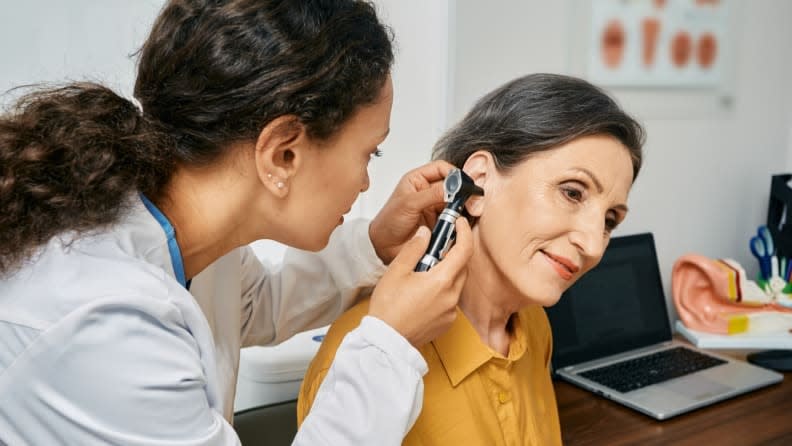Fact check: Diet and exercise benefit kidney health, not ear rubbing
The claim: Rubbing your ears will improve kidney health
A March 4 Facebook video (direct link, archive link) shows a woman in a white lab coat pulling and rubbing her ears while touting the supposed health benefits of doing so.
“The ear is the sensory organ of our kidney,” she says at one point in the video. “A lot of ear problems actually are a sign that your kidney’s energy needs extra support. Practice these four steps – your body will receive unexpected results.”
The video was shared more than 10,000 times in less than a month.
Follow us on Facebook! Like our page to get updates throughout the day on our latest debunks
Our rating: False
Experts told USA TODAY there is no evidence ear exercises have any benefits for the kidneys. The best way to improve kidney health is through a healthy diet and exercise.
Benefits of reflexology are unproven
There is no basis to support the claim made in the video, multiple experts told USA TODAY.
“There are no trusted, evidence-based studies showing that rubbing one’s ears can impact kidney health or kidney function,” said Dr. Julie Wright Nunes, an associate professor at the University of Michigan Department of Internal Medicine who studies Chronic Kidney Disease.
The practice of applying pressure to a certain body part for healing purposes is called reflexology, but its purported benefits have not been scientifically proven, according to the National Center for Complementary and Integrative Health.
Fact check: Skin pinch test can be used to check for dehydration
Dr. Ali Gharavi, chief of the nephrology division at NewYork-Presbyterian and Columbia University Irving Medical Center, told USA TODAY he was “very surprised” by the claim linking ear exercises and kidney health.
Nephrology is a subspecialty of internal medicine focused on the diagnosis and treatment of diseases of the kidney, according to the American College of Physicians.
Some rare conditions can affect both kidney function and hearing, Gharavi said. There are also some medications or toxins that can harm the kidneys and cause hearing loss.
“However, there is no evidence that changes in ear function impact kidney function,” Gharavi said.

Among the most common causes of kidney disease are high blood pressure and diabetes, according to the Centers for Disease Control and Prevention. Both conditions can be improved through diet, exercise and medication, Gharavi said.
Those steps can also be taken by people looking to improve their overall health, which Gharavi said positively affects kidney health as well.
Both experts said anyone diagnosed with or at risk for kidney disease should consult with a medical doctor. They recommended people seek information on kidney health from peer-reviewed scientific sources or reputable organizations such as the American Kidney Fund and the National Kidney Foundation.
USA TODAY reached out to the user who shared the claim for comment.
Our fact-check sources:
Dr. Julie Wright Nunes, March 29, Email exchange with USA TODAY
Dr. Ali Gharavi, March 28, Email exchange with USA TODAY
National Center for Complementary and Integrative Health, January 2020, Reflexology
American College of Physicians, accessed March 31, Nephrology
CDC, accessed March 31, Chronic Kidney Disease Basics
Thank you for supporting our journalism. You can subscribe to our print edition, ad-free app or electronic newspaper replica here.
Our fact-check work is supported in part by a grant from Facebook.
This article originally appeared on USA TODAY: Fact check: Diet and exercise benefit kidney health, not ear exercises

